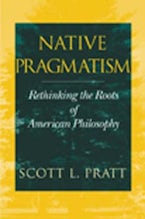"Accepting the common view that pragmatism is the uniquely American philosophy, Pratt (Univ. of Oregon) maintains that much of what American philosophy is known for can be traced to its origins in the borderlands between Europe and America and its 'originality' to well—established aspects of Native American thought. At these borderlands, he discerns the emergence of an attitude of resistance to the attitudes of European colonialism. This new attitude drove commitments to interaction, pluralism, community, and growth, the core of pragmatic thought. He plumbs Native American thought for sources of these commitments; he argues for the influence of a Native Prophetic movement on Benjamin Franklin, whose ideas in turn influenced the initial formulation of pragmatism by Peirce and James. He also asserts a prominent role for Native thought in the development of the women's movement. Readers may be skeptical regarding the extent to which Native thought shaped pragmatism, and Pratt admits that his volume is not intended as a comprehensive history, but rather as an additional perspective. Read as such, this is an interesting and insightful study of the origins of American pragmatism. For general readers and upper—division undergraduates through faculty."—S. C. Pearson, emeritus, Southern Illinois University at Edwardsville Read as such, this is an interesting and insightful study of the origins of American pragmatism. For general readers and upper—division undergraduates through faculty., Choice, November 2002
". . . [T]his is an interesting and insightful study of the origins of American pragmatism. November 2002"—Choice

